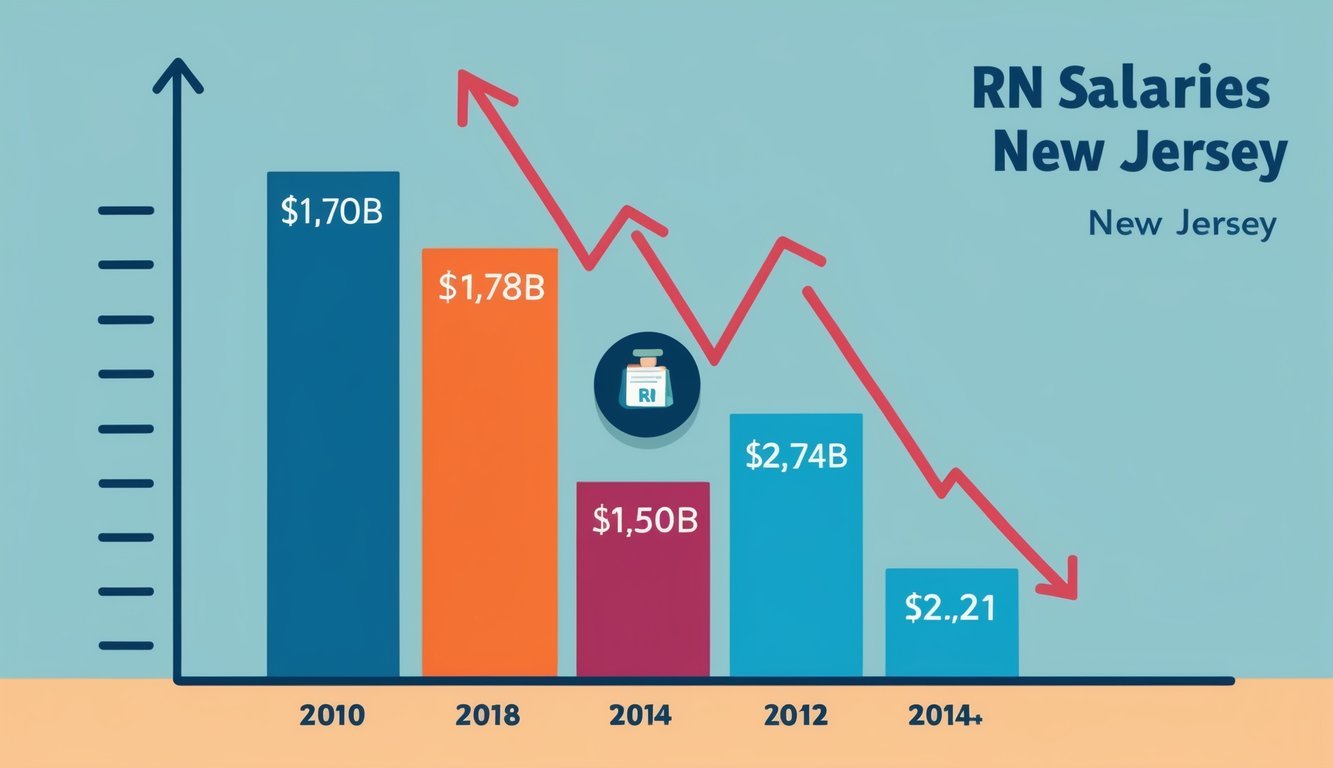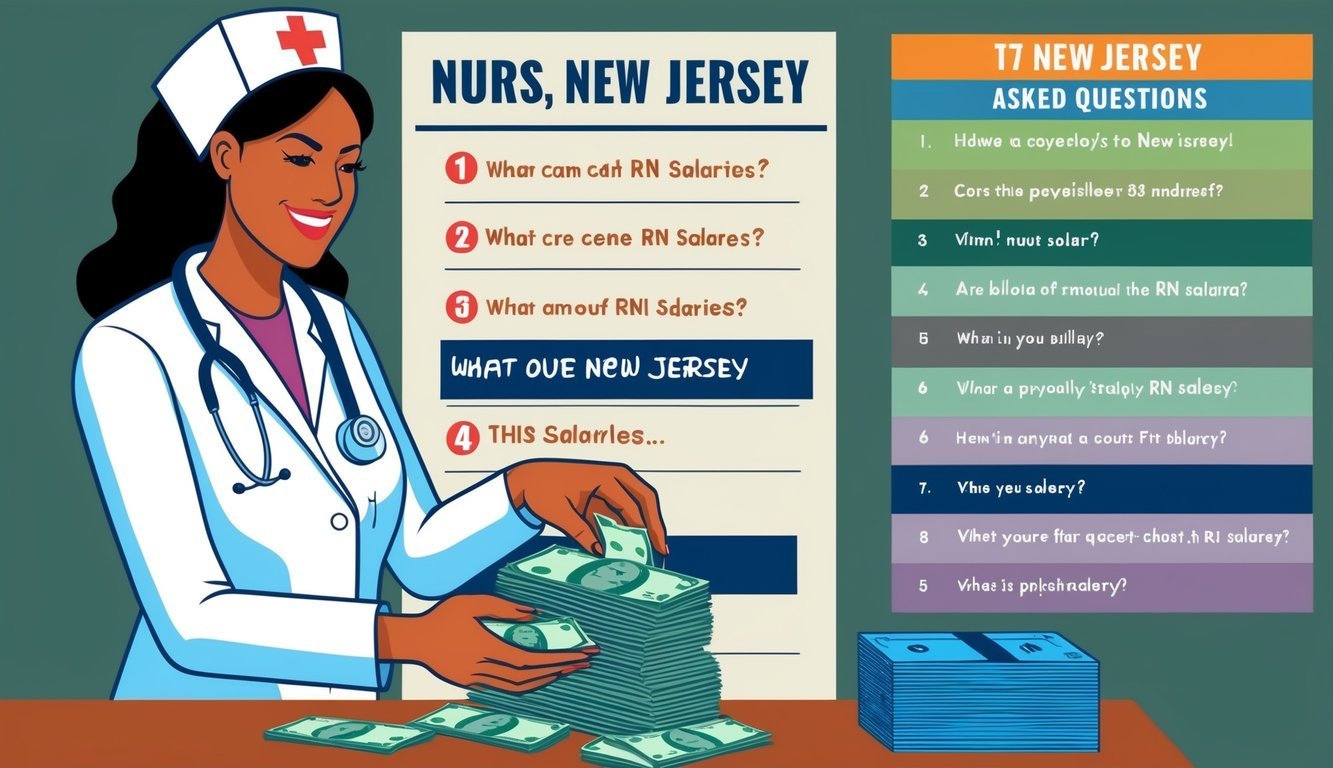As you consider a career in nursing, you need to understand the compensation landscape. In New Jersey, registered nurses (RNs) earn an average salary of around $78,000 per year.
Meanwhile, their hourly rates typically range between $34 and $56. This range reflects the varying levels of experience, education, and specialization among RNs in the state.
The job market for registered nurses in New Jersey is strong, with a steady demand driven by factors such as an aging population and increased healthcare needs.
While base salaries are important, many RNs also benefit from additional pay components such as overtime pay, bonuses, and shift differentials.
These factors can significantly boost overall earnings and enhance job satisfaction.
Navigating the different roles and settings available in New Jersey can ensure you find the right balance between work and compensation.
With the right qualifications and experience, you can position yourself to earn a competitive salary while making a meaningful impact in the lives of patients.
Key Takeaways
- The average RN salary in New Jersey is about $78,000 per year.
- Job demand for RNs in New Jersey remains strong due to healthcare needs.
- Additional pay like overtime can significantly increase overall earnings.
Overview of Registered Nurse Salaries in New Jersey
Registered Nurses (RNs) in New Jersey earn competitive salaries influenced by various factors.
Understanding these elements can help you make informed career choices in this field.
Below is an overview of the key aspects that impact RN salaries in the state.
Factors Influencing RN Salaries
Several factors play a significant role in determining the salary of a Registered Nurse in New Jersey. Experience is a primary factor, as more years in the field typically lead to higher pay.
Meanwhile, education also matters; RNs with advanced degrees may earn more than those with just an associate degree.
Certifications can enhance your qualifications and boost your earning potential.
Similarly, the type of employer can influence salaries; positions in hospitals may pay more than those in clinics or home health care.
Here’s a brief overview of how these factors can affect salary ranges:
| Factor | Detail |
|---|---|
| Experience | More experience = Higher Salary |
| Education | Advanced degrees = Higher Pay |
| Certifications | Specialized skills = Higher Earnings |
| Type of Employer | Hospitals often pay more |
Comparison to National Averages
The average annual salary for RNs in New Jersey stands at about $89,690, which is higher than the national average of $89,010.
This reflects the state’s higher cost of living and demand for healthcare professionals.
Many RNs in New Jersey earn between $70,920 and $117,990, with $34.10 to $56.73 per hour on average.
This pay scale makes New Jersey one of the more lucrative states for RNs.
To explore more about how New Jersey’s RN salaries compare to other states, you can check out the detailed differences on NurseJournal.
Regional Salary Variations in New Jersey
Salaries for Registered Nurses can vary significantly across New Jersey.
For example, Jersey City is among the highest-paying areas, with average salaries reaching up to $98,090.
Meanwhile, cities like Trenton and Atlantic City also report strong earnings, though slightly lower.
While Trenton’s average is around $94,690, Atlantic City’s might be closer to $89,000.
Here’s a quick comparison of registered nurse salaries in key locations:
| City | Average Salary |
|---|---|
| Jersey City | $98,090 |
| Trenton | $94,690 |
| Atlantic City | $89,000 |
This regional variation reflects differences in the cost of living and demand for nursing services across the state.
Advanced Nursing Roles and Earnings

Advanced nursing roles offer significant earning potential, reflecting higher levels of education and specialized skills.
You can expect varying salaries based on specific roles like nurse practitioners, nurse anesthetists, and certified nurse midwives.
Each role has distinct responsibilities that affect overall compensation.
Nurse Practitioner Salary Insights
As a nurse practitioner (NP), you can earn a substantial salary.
In New Jersey, the average salary is approximately $138,703, with a typical range from $128,772 to $150,787.
A nurse practitioner often requires a Master of Science in Nursing (MSN) and additional certifications.
Factors influencing NP salaries include:
- Location: Urban areas tend to offer higher salaries.
- Specialty: Some specialties, like mental health or acute care, might pay more.
- Experience: More years of practice can lead to higher earnings.
For more detailed salary information, visit Nurse Practitioner Salary in New Jersey.
Nurse Anesthetist Compensation
Nurse anesthetists typically earn some of the highest salaries among nursing roles.
In New Jersey, the salary for this position can range significantly, often exceeding $150,000 annually.
This role requires advanced training and certification in anesthesia.
The earning factors include:
- Experience Level: More experienced nurse anesthetists generally earn more.
- Type of Facility: Working in hospitals often offers higher compensation than outpatient settings.
- Certifications: Additional certifications may enhance earning potential.
Check out more details at Advanced Practice Registered Nurse Salary in New Jersey.
Certified Nurse Midwife Earnings
Certified nurse midwives (CNMs) also enjoy competitive salaries.
In New Jersey, the average salary is around $132,271, with a range from $116,077 to $151,444.
CNMs provide essential care related to pregnancy, childbirth, and women’s health.
Important factors affecting CNM salaries include:
- Certification: CNMs must hold proper credentials.
- Geographic Location: Salaries can vary between rural and urban areas.
- Employment Setting: Working in hospitals versus private practice can lead to salary differences.
For more insights, visit GovSalaries – Advanced Practice Nurse Salary in New Jersey.
Additional Pay Components

When considering an RN salary in New Jersey, it’s important to acknowledge the various additional pay components.
These can significantly boost your overall earnings.
This section will cover bonuses, commissions, profit sharing, and tips.
Understanding Bonuses and Incentives
Many healthcare organizations offer cash bonuses or incentives to attract and retain registered nurses.
These bonuses can vary based on factors like performance, longevity, or critical skills.
For example, you might receive a sign-on bonus when you start a new job.
Such bonuses can range from $5,000 to $15,000 or more, depending on the facility and your specialty.
Some employers also provide performance bonuses, rewarding nurses who excel in patient care, safety, or efficiency.
These incentives not only enhance your salary but also serve as motivation to maintain high standards in your work.
Commission and Profit Sharing
Commission and profit-sharing options are less common in nursing but can exist, especially in roles that involve sales of medical equipment or services.
If you venture into a position where you connect patients with specific products or services, commissions may apply.
Profit-sharing plans offer another way to earn.
In this case, a portion of the company’s profits is shared with employees.
Though not standard, some hospitals and clinics may implement this to encourage teamwork and investment in the organization’s success.
Tips and Other Forms of Extra Income
While tipping is not typical for nurses, some may receive small gratuities, especially in private practice settings or home health care.
These can vary widely but often reflect client appreciation for exceptional service.
Additionally, nurses can explore other avenues like teaching or consulting.
Offering your expertise in workshops or community health programs can yield extra income.
These opportunities allow you to diversify your earnings and utilize your skills outside of traditional nursing roles.
Job Market Trends for Registered Nurses

The job market for registered nurses in New Jersey shows promising trends, driven mainly by demographic changes and the continuing demand for healthcare services.
Understanding these trends helps you navigate your career path in nursing effectively.
The Impact of An Aging Population
The aging population in the United States is a significant factor affecting the demand for registered nurses.
As the baby boomer generation ages, more individuals require healthcare services, leading to increased job openings in nursing.
- Growth in elderly-care facilities: More nursing homes and assisted living facilities are opening to care for seniors.
- Chronic health conditions: Older adults are more likely to have chronic illnesses, increasing the need for medical attention.
This demographic shift ensures that job security for registered nurses remains strong.
You can expect your role to expand as healthcare systems adapt to these challenges.
For more details, check out resources from Nursing World.
Job Security and Growth Projections
Job security for registered nurses is favorable, with strong growth projections in various healthcare settings.
According to numerous reports, registered nursing jobs are expected to grow significantly over the next decade.
| Year | Projected Job Growth (%) | Average Salary ($) |
|---|---|---|
| 2024 | 7-10% | $78,034 – $98,090 |
| 2030 | 10-12% | $90,000 – $105,000 |
- Diverse employment opportunities: You can work in hospitals, clinics, and community health settings.
- Potential for advancement: Higher education, like obtaining a BSN, can lead to better salaries and positions.
These trends highlight that entering the nursing field can be a solid decision for long-term career success.
For up-to-date information on salary trends, visit Salary.com.
Cost of Living and RN Salaries
When considering RN salaries in New Jersey, it’s essential to understand how the cost of living impacts your income.
The adjustments made for living expenses can greatly influence your overall financial well-being as a nurse in the state.
Salary Adjustments for Cost of Living
The cost of living index in New Jersey is notably higher than the national average.
This means that while you may earn a competitive average RN salary of around $89,690 per year, your purchasing power could be compromised by higher expenses.
For example, you might find the following expenses adjusted due to the cost of living:
| Item | National Average | New Jersey Average |
|---|---|---|
| Groceries | $300/month | $400/month |
| Rent (1-bedroom) | $1,200/month | $1,800/month |
| Utilities | $150/month | $250/month |
These adjustments may push the effective salary lower unless you are earning top-tier wages.
Top-tier wages can reach up to $117,990 per year for experienced nurses.
Understanding these factors helps you gauge your financial situation more clearly.
Affordability in High-Paying Cities
New Jersey has cities where salaries for nurses are notably high.
However, that often comes with a higher cost of living.
For instance, cities like Newark and Jersey City offer lucrative pay but also have steep housing and transportation costs.
In these areas, the affordability can vary.
Here’s a quick look at average RN salaries versus estimated monthly expenses:
| City | Average RN Salary | Average Rent (1-bedroom) | Estimated Monthly Expenses |
|---|---|---|---|
| Newark | $89,000 | $2,000 | $4,500 |
| Jersey City | $95,000 | $2,500 | $5,000 |
While high salaries can be appealing, it’s crucial to evaluate whether they are enough to cover the increased cost of living.
Balancing income and expenses will lead to a better quality of life in your nursing career.
Leading Employers and Compensation Packages

In New Jersey, various employers offer competitive salaries and benefits for registered nurses (RNs) and licensed practical nurses (LPNs).
Understanding which organizations pay the most and how public versus private sector salaries compare can help you make informed career choices.
Top Paying Hospitals and Health Systems
Several hospitals and health systems in New Jersey are known for offering attractive compensation packages to their nursing staff.
Some of the top employers in the region include:
| Hospital/Health System | Average Annual Salary |
|---|---|
| Hackensack Meridian Health | $100,000 |
| RWJBarnabas Health | $97,000 |
| Atlantic Health System | $95,000 |
| Virtua Health | $92,000 |
These institutions not only provide competitive salaries but also comprehensive benefits.
These benefits include health insurance, retirement plans, and opportunities for continuing education.
Working in these leading organizations may also offer additional incentives like sign-on bonuses and shift differentials.
Comparing Public and Private Sector Salaries
The salary for RNs in New Jersey can differ significantly between public and private sectors.
On average, registered nurses in public hospitals earn about $10,000 more annually compared to their counterparts in private facilities.
Here’s a comparison based on recent data:
| Sector | Average Salary | Benefits |
|---|---|---|
| Public Sector | $95,000 | Better job security, pensions |
| Private Sector | $85,000 | Potential for higher bonuses |
Public sector positions often provide more stability and benefits, while private sector jobs may offer higher immediate pay.
Ultimately, your choice may depend on which factors matter most to you regarding compensation and job satisfaction.
Frequently Asked Questions

In this section, you will find important details about RN salaries in New Jersey.
The questions cover various aspects, including average wages, starting salaries, and comparisons with neighboring states.
What is the average hourly wage for an RN in New Jersey?
The average hourly wage for registered nurses in New Jersey is approximately $45.52.
This rate can vary based on experience, education, and the specific healthcare facility.
What is the typical starting salary for a newly graduated RN in New Jersey?
Newly graduated RNs in New Jersey can expect a starting salary of around $70,920 per year or about $34.10 per hour.
These figures can differ based on factors like location and the employer.
How does RN compensation in New Jersey compare with that in New York?
RN compensation in New Jersey is competitive but generally slightly lower than in New York.
For example, RNs in New York may earn an average of $98,000 per year compared to the average RN salary in New Jersey.
What is the average monthly salary for an RN in New Jersey?
The average monthly salary for an RN in New Jersey is roughly $8,257.
This figure is based on an annual salary of about $99,090, showing a stable earning potential for nurses in the state.
What are the salary expectations for an RN with a BSN in New Jersey?
RNs with a Bachelor of Science in Nursing (BSN) in New Jersey often earn higher salaries.
With a BSN, you can expect to start at a higher salary due to increased qualifications and expertise.
Which hospitals in New Jersey offer the highest pay for nurses?
Hospitals in New Jersey that are known for offering high pay for nurses include Hackensack University Medical Center, Baptist Medical Center, and St. Barnabas Medical Center.
These facilities often provide competitive salaries and additional benefits to attract skilled nursing professionals.

